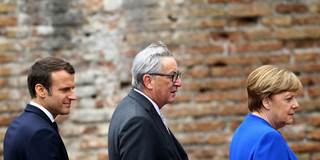Despite their differences, British Prime Minister Theresa May, French President Emmanuel Macron, and German Chancellor Angela Merkel have one thing in common. All are building a new type of politics – a kind of centrist populism – that is increasingly filling the gap left by the waning of traditional political parties' influence.
PRINCETON – British Prime Minister Theresa May, French President Emmanuel Macron, and German Chancellor Angela Merkel are different in many ways. May unexpectedly assumed her position last year after the Brexit vote, when her predecessor, David Cameron, resigned. Macron has even less experience: the presidency, which he just took over last month, is his first-ever elected position. Meanwhile, Merkel has served as chancellor since 2005 (and a parliamentarian since 1991), making her Europe’s longest-serving head of government.
But these three European leaders also have a lot in common. They are all in a relatively strong position domestically. Indeed, May and Merkel both appear likely to win their countries’ general elections this week and in September, respectively, and Macron secured a decisive victory in France. More important, they are all building a new type of politics to fill the gap left by the decline in traditional political parties’ influence.
The new political paradigm is founded on a kind of centrist populism, which blends support for globalization with a healthy dose of social protection and a generous pinch of patriotism. And it is highly personal. May is unambiguously the key attraction in the British election, and her divided Conservative Party is now downplaying the party label. Merkel, too, has become the central figure in a changing Christian Democratic Union party, which lacks alternative leaders. Macron created his own party.

PRINCETON – British Prime Minister Theresa May, French President Emmanuel Macron, and German Chancellor Angela Merkel are different in many ways. May unexpectedly assumed her position last year after the Brexit vote, when her predecessor, David Cameron, resigned. Macron has even less experience: the presidency, which he just took over last month, is his first-ever elected position. Meanwhile, Merkel has served as chancellor since 2005 (and a parliamentarian since 1991), making her Europe’s longest-serving head of government.
But these three European leaders also have a lot in common. They are all in a relatively strong position domestically. Indeed, May and Merkel both appear likely to win their countries’ general elections this week and in September, respectively, and Macron secured a decisive victory in France. More important, they are all building a new type of politics to fill the gap left by the decline in traditional political parties’ influence.
The new political paradigm is founded on a kind of centrist populism, which blends support for globalization with a healthy dose of social protection and a generous pinch of patriotism. And it is highly personal. May is unambiguously the key attraction in the British election, and her divided Conservative Party is now downplaying the party label. Merkel, too, has become the central figure in a changing Christian Democratic Union party, which lacks alternative leaders. Macron created his own party.